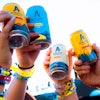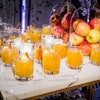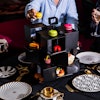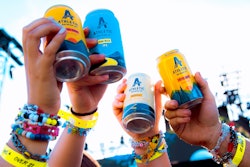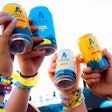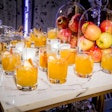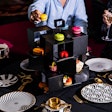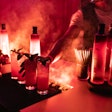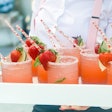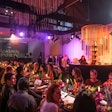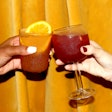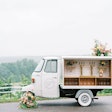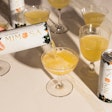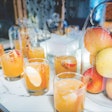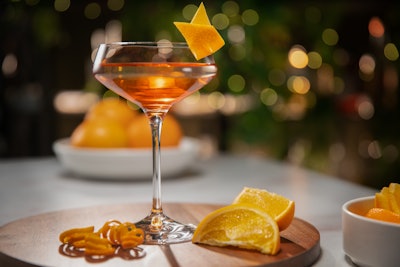
In late 2023, while speaking on a wellness-focused panel, Laura Nelson decided to conduct an experiment: She asked the event’s 125 attendees if they identified as "sober, sober-ish, or sober-curious." The response, she remembers, was telling.
“About a quarter of the room raised their hand—but they raised their hand very hesitantly, looking around to see if they were the only ones,” she says. This moment of vulnerability highlighted a common yet unspoken challenge: Despite their reasons—curiosity, religion, recovery—many felt isolated in their sober choices. Nelson, a longtime veteran of the dental industry who travels to and speaks at roughly 20 conferences per year, could relate, having stopped drinking a few years prior.
"The first 45 minutes or so were fine," Nelson shares about her initial experiences at networking events after giving up alcohol. "But as the evening wore on, I found myself going back to my hotel room because there was nothing else except for the drinking.”
 The Inclusive Event Planner is free to download at inclusiveeventplanner.com.Photo: Courtesy of Laura Nelson
The Inclusive Event Planner is free to download at inclusiveeventplanner.com.Photo: Courtesy of Laura Nelson
In her book, Nelson points out some telling stats:
- 34% of people are trying to drink less
- 28% of people have tried to quit alcohol
- 24% of people don’t drink at all
That’s a large portion of your attendees who might feel left out of professional events—or worse, feel peer pressured into drinking when they don’t want to, Nelson points out. “We wanted to build a community that helped people make sober choices as a professional, and to elevate and celebrate sober choices.” For meeting planners, that means “showing up and helping people feel connected—without using alcohol as the main way to connect."
In a recent conversation with BizBash, Nelson shared some of the tips she touches on in her book:
1. Help people feel included before they arrive.
“We know that meeting attendance is down, and we know that we can often get all of the speakers and content online. So the reason people go to conferences and events in person is for the connection,” Nelson points out. “But when you center that connection around alcohol, you’re missing a percentage of people who are either going back to their rooms early, or aren’t coming at all.”Nelson believes that true inclusivity should start from the invitation and registration forms. “For 2025 events, I’ve actually started putting that I don’t drink alcohol on registration forms, under dietary restrictions,” she notes. Making it easy and normal for guests to check that box not only makes them feel included, it gives planners a better idea of just how many guests might want nonalcoholic options so you don’t blow your budget by over-ordering.
Think about the wording on invitations and schedules too, Nelson adds. “Some people don’t like the word 'mocktail,' so you can also use words like 'alcohol-free,' 'sober-friendly options,' or 'nonalcoholic options,'” she says. “Think about changing the word 'happy hour' to 'networking hour.' Use words that make it clear you’re going to have different options.”  “I didn’t feel like I was an alcoholic, but I also felt like it was a huge part of my life, especially when I was traveling and speaking the next morning," says Nelson (pictured). "I came across a TED Talk about gray area drinking and it helped me make the decision to stop drinking."Photo: Courtesy of Laura Nelson
“I didn’t feel like I was an alcoholic, but I also felt like it was a huge part of my life, especially when I was traveling and speaking the next morning," says Nelson (pictured). "I came across a TED Talk about gray area drinking and it helped me make the decision to stop drinking."Photo: Courtesy of Laura Nelson
2. Create networking experiences that don’t center around the bar.
Remember that networking events don’t always need to take place during happy hour. “Schedule it over coffee, or have a networking lunch,” Nelson advises. “We all know that interacting with strangers is hard, and alcohol can be a crutch—so let’s find other ways to make the networking easier.”An obvious way to do that is by programming activities that naturally get guests talking and interacting, like games; trivia; a scavenger hunt; speed dating; karaoke; or a great DJ, band, or comedian, she suggests. “Alcohol can be a part of it, sure, but not the main attraction.”
3. Be strategic with nonalcoholic options.
The first thing Nelson typically gets asked is: “What mocktails should I make?” And while her book does include some recipes, she cautions planners to be mindful of what everyone else is drinking—because many guests don’t want to draw attention to the fact that they are sober. “If you’re serving beer and wine, I don’t want a mocktail because that’s going to stand out from what everyone else is drinking,” she notes. “So the first thing I would say is, find drinks that are similar to what’s being served with alcohol.”Also, make the nonalcoholic options easy to order. “People who are in recovery, for example, are subconsciously nervous about the whole thing," Nelson says. "It’s hard to order a drink when other people are standing around. Make it obvious—have a bottle or a sign sitting on the bar they can point to. Make it easy for people to order without major discussions around it.”
4. Train bartenders to understand the importance of nonalcoholic options.
Nelson often finds a disconnect between the meeting planner, the F&B manager, and the actual people behind the bar. “I implore event planners to really push the event venues to understand the importance of this,” she says. “It may not seem like a big deal to hand someone a cup accidentally with alcohol in it—but to someone pregnant or in recovery, it’s a huge deal. Just like we don’t want to give somebody nuts in a cupcake if they have a nut allergy, there needs to be training and sensitivity about the bar.”5. Consider your room layouts and event formats.
Thinking through your event format is also an important step toward inclusivity, Nelson notes. Consider a venue with quieter pockets of space for guests to have conversations, with or without alcohol, she advises. “If people don't want to be in the main part of the party, maybe there’s furniture outside of the loud room—where it doesn’t feel like the kids’ table, but it allows them to have conversations and hang out in a more low-key way.”It’s also important to think about the location where your event is being held, particularly for smaller team meetings and events like a holiday party—which often center around things like wine and beer tastings or trips to bars. “Let’s be conscious of the fact that there are people in your environment who are secretly sober—but in their professional life, they can’t choose the settings they're in. You can still have alcohol, but think about what else you can do during these gatherings.”
6. Recognize and appreciate this untapped demographic.
Nelson notes that these tips apply to lots of guests, far beyond just those who are completely sober. In professional settings, for example, many attendees may want to limit themselves to one drink. “Younger generations are drinking less and less,” she points out. “These changes are needed and wanted.”“Event planners don’t realize they’ve been missing attendees,” Nelson adds. “This is often the unspoken crowd, the quiet crowd that just tried to blend in. But people are increasingly looking for inclusivity and wellness—it’s a topic that’s not going away, and I believe you’ll find a whole host of people who are going to be so happy to feel included.”
Download a free copy of The Inclusive Event Planner at inclusiveeventplanner.com, and learn more on the Sober Life Rocks website or LinkedIn community. Nelson is also available for consultations with event and conference professionals.
